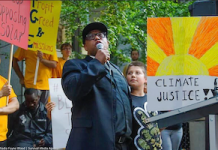
In an unprecedented mobilization of Israel’s civil society, massive protests were organized over the past three months opposing Prime Minister Benjamin Netanyahu and his extremist religious right-wing government’s effort to eviscerate the nation’s judicial branch. The overhaul seeks to empower Israel’s legislature to override supreme court rulings and give politicians the exclusive to power appoint judges – removing critical checks and balances.
Opponents charge that Netanyahu is advocating these changes to insulate himself from the outcome of a trial where he now stands accused of bribery, fraud and breach of trust. After a nationwide strike, and elite Israeli Air Force fighter pilots declared their support for the protests, Netanyahu announced he would delay the judicial legislation to allow time for negotiations – but protests continue.
Meanwhile, Palestinians are suffering a dramatic surge in killings after Israel’s military staged near-daily raids across the occupied West Bank, and the government announced a major increase in building Jewish settlements in the occupied territories. Between The Lines’ Scott Harris spoke with author Josh Ruebner, adjunct lecturer at Georgetown University’s Justice and Peace Studies program, who examines Israeli civil society’s historic protests against Netanyahu’s attack on democracy, rising violence targeting Palestinians and the Biden administration’s response.
JOSH RUEBNER: So these protests in which we’ve seen hundreds of thousands of mostly Jewish-Israeli citizens out on the street protesting Prime Minister Benjamin Netanyahu’s attempt to impose a judicial coup and install himself as the supreme leader in Israel in a very unchecked way has been very, very dramatic evidence that when Jewish-Israelis want to mobilize on the streets to protest, they can make their voices heard and they can be very effective in doing so.
Temporarily, the Israeli prime minister has decided to postpone moving forward with these plans to really eviscerate the judiciary and prevent the Supreme Court from being the final say in the country. And while Jewish-Israelis are rightfully worried to be concerned about the evisceration of their political rights under this extremist Israeli government, it really doesn’t speak at all to the fact that for 75 years Israel has ruled over the Palestinian people in a separate and unequal way where Palestinians have either less or no political rights based on their political status.
And that discussion of Israel’s apartheid rule over the Palestinian people has sadly been lacking for most of these protests. The Israeli military has killed 94 Palestinians already this year, making it on pace to be a much, much deadlier year for Palestinians in the West Bank than was last year, which is the most deadly in almost 20 years.
So we are seeing this dramatic escalation of military attacks by Israel on Palestinians who are struggling for their freedom under Israeli military rule. And at the same time, we’re really seeing unprecedented expansion of Israel’s settlements in the West Bank, which are, of course, illegal under international law and actually a war crime. About four to six weeks ago I think it was, Israel announced the expansion of 10,000 settlement units, which was the largest single expansion of settlements ever announced at one time over the past 55 years.
This is an example of how dramatically escalating these efforts are by Israel to continue to colonize Palestinian lands while intensifying violence against Palestinians.
SCOTT HARRIS: Josh, I did want to ask you about the Biden administration and the response to all this. Secretary of State Antony Blinken has made some noise, not much, about multiple crises that we’ve been talking about tonight. What has the Biden administration said so far-if anything, and what would you like them to say?
JOSH RUEBNER: Well, first of all, I think it’s important to note that the Biden administration has failed to reverse almost all of the Trump administration’s incredibly radical policies. How many times can you say that you oppose Israel’s expansion of settlements and not do anything about it and still consider yourself to be credible? The fact is that the United States has tremendous leverage over Israel and we’re not using it to exert any pressure at all to achieve what are supposed U.S. policy goals, like ending Israeli settlements, like ending Israel’s home demolitions of Palestinian houses.
So more and more senators and members of Congress are demanding, like Sen. Chris Van Hollen on the Senate Foreign Relations Committee that there be actual accountability imposed on Israel for violating U.S. laws when it comes to using weapons against Palestinian civilians, when it comes to continuing its colonization of Palestinian lands. So what I’d like to see from the Biden administration are some actual steps toward holding Israel accountable — at the very least conditioning weapons to Israel on the end to Israel’s military occupation, the end to Israel’s human rights abuses against the Palestinians.
But none of these things are being considered seriously by the Biden administration. If they are, they’re not being talked about publicly.
For more information, visit Josh Ruebner’s website at joshruebner.com.
Listen to Scott Harris’ in-depth interview with Josh Ruebner (17:56) and see more articles and opinion pieces in the Related Links section of this page.
For the best listening experience and to never miss an episode, subscribe to Between The Lines on your favorite podcast app or platform: Apple Podcasts, Spotify, Stitcher, Google Podcasts, Amazon Music, Tunein + Alexa, Castbox, Overcast, Podfriend, iHeartRadio, Castro, Pocket Casts, RSS Feed.




